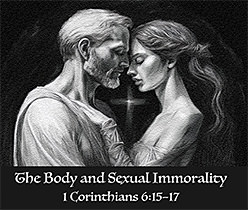First Corinthians 6:12–20 . . .
Of Drives and Appetites
Paul’s teaching in today’s passage is an abbreviated version of what he already taught in Romans 6. The structure of the text may be viewed from at least two vantage points.
1) In vv. 12–14 (shown at the bottom of this page), Paul focuses on a statement about the Corinthians’ doctrinal basis for their immorality. This is either a false or distorted premise held by the Corinthians, which Paul proceeds to correct. Verses 15–20 deal with the problem of immorality from the perspective of the ignorance of the Corinthians — what they don’t know (or choose to forget). Thus, three times in these verses we find, “Did you not know…?” Paul turns their attention to what they should know and its implications for sexual morality.
2) There’s a second way of understanding the structure of our text. Verses 12–20 give the biblical basis for sexual morality; specifically why sexual immorality is wrong for the believer: It’s an obstacle to one’s spiritual growth. Verses 13–20 demonstrate that immorality is an offense against the Triune God, as follows:
† Sexual immorality is an offense against God — vv. 13–14; Jesus Christ — vv. 15–17; and the Holy Spirit — vv. 18–20.
Short-term drives and appetites lead to long-term disaster. Nowhere is this truer than in the area of sexual immorality. For a few minutes of pleasure, countless men and women will throw their lives away. Just think for a moment about the potential consequences of sexual sin: loss of fellowship with God, divorce, disease, pregnancy, guilt, estrangement from family and friends, damage to one’s reputation, and countless others. Many consequences of this sin are brutal. This reality ought to keep us from sexual sin. Yet, if we’re honest, most of us assume that we’ll be the exception to these consequences. So we go on our own merry way, sinning.
Therefore, the apostle Paul uses another approach in helping us overcome sexual immorality. He uses a positive affirmation: “Your body is God’s body.” In today’s text, Paul provides two ways that we can honor God with our bodies.
1) Refuse to be mastered by your body (v. 12). In this opening verse, Paul shares a principle that governs the entire passage. He argues that although he and the Corinthians have certain freedoms in Christ, these are to be used for your good and God’s glory. God wants to be glorified in your body; he wants the best for you, so he urges you to refuse to be mastered by your body, since your body is God’s body.
2) Refuse to dishonor God with your body (vv. 13–20). In the next eight verses, Paul argues that sexual immorality is an offense against Father God (vv. 13–14), the Lord Jesus Christ (vv. 15–17), and the Holy Spirit (vv. 18–20). The last three verses bring tremendous encouragement about the resources God has given you to live a life of sexual purity.
Sexual allurement is extremely enticing and powerful. Your drive and appetite for it promise nothing but pleasure and satisfaction; but rarely are the promises delivered.
Note: 1st Corinthians challenges believers to examine every aspect of their lives through the lens of the Gospel. In chapters 5–7, Paul presents these three challenges:
Dealing with a case of incest (ch. 5) | Lawsuits among believers (ch. 6) | Concerning married life (ch. 7)
› Watch BibleProject’s superb animated video (1 min.) that highlights Paul’s messages in these three chapters.
† Summary of 1 Corinthians 6:12–20
The text of this passage addresses important issues related to Christian sexual ethics and the sanctity of the body. Here’s my summary of its key points:
• The “I Have the Right to Do Anything” Principle
Paul begins by addressing a slogan likely used by some Corinthians: “I have the right to do anything” (v. 12). He counters this with two important qualifications:
1) Not all things are beneficial.
2) We shouldn’t be mastered by anything.
This establishes a framework for Christian freedom that’s guided by wisdom and self-control.
• The Body and Sexual Immorality
Next, Paul emphasizes that the body is meant for the Lord, not for sexual immorality. He makes three important points:
1) The body is a member of Christ (v. 15).
2) Sexual union with a prostitute unites a man’s body with hers (v. 16).
3) Sexual immorality is a sin against one’s own body.
• The Body as a Temple
Paul introduces the powerful metaphor of the body as a temple of the Holy Spirit (v. 19). This concept has several implications:
1) Our bodies don’t belong to us, but belong to God.
2) We “were bought at a price” — Christ’s sacrifice.
3) We’re called to glorify God with our bodies (v. 20).
• Application to Christian Life
Overall, this passage has significant implications for Christian living:
1) It calls for a high view of the human body and sexuality.
2) It emphasizes the importance of sexual purity.
3) It grounds sexual ethics in theology, particularly Christology and pneumatology.
The text encourages believers to view their bodies as instruments for God’s glory, rather than for selfish pleasure or immoral practices.
In the context of the Corinthian church, this teaching likely addressed specific issues related to sexual practices in the Greco-Roman world, particularly the use of temple prostitutes. Paul’s teaching here forms a crucial part of his broader sexual ethic, which stands in contrast to the prevailing cultural norms of his time.
- Q. 1 How can we go about guarding ourselves from temptation?
- Q. 2 Do you see the following as a help or hindrance for your sexual immorality appetite? If so, how do they help or hinder you?
- Television and movies | Books and magazines | Internet accessibility | An accountability partner
- Q. 3 How do you feel about Paul’s statement (vv. 19b–20a): “You are not your own; you were bought at a price”?
1 Corinthians 6:12–20
New International Version (NIV)
[You can view it in a different version by clicking here; you can also listen to this chapter.]
Sexual Immorality
12“I have the right to do anything,” you say — but not everything is beneficial. “I have the right to do anything” — but I will not be mastered by anything. 13You say, “Food for the stomach and the stomach for food, and God will destroy them both.” The body, however, is not meant for sexual immorality but for the Lord, and the Lord for the body. 14By his power God raised the Lord from the dead, and he will raise us also. 15Do you not know that your bodies are members of Christ himself? Shall I then take the members of Christ and unite them with a prostitute? Never! 16Do you not know that he who unites himself with a prostitute is one with her in body? For it is said, “The two will become one flesh.” 17But whoever is united with the Lord is one with him in spirit.
18Flee from sexual immorality. All other sins a person commits are outside the body, but whoever sins sexually, sins against their own body. 19Do you not know that your bodies are temples of the Holy Spirit, who is in you, whom you have received from God? You are not your own; 20you were bought at a price. Therefore honor God with your bodies.


